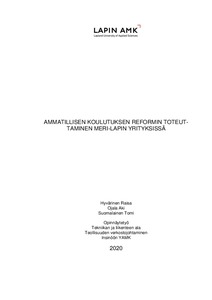AMMATILLISEN KOULUTUKSEN REFORMIN TOTEUTTAMINEN MERI-LAPIN YRITYKSISSÄ
Suomalainen, Tomi; Hyvärinen, Raisa; Ojala, Aki (2020)
Suomalainen, Tomi
Hyvärinen, Raisa
Ojala, Aki
2020
All rights reserved. This publication is copyrighted. You may download, display and print it for Your own personal use. Commercial use is prohibited.
Julkaisun pysyvä osoite on
https://urn.fi/URN:NBN:fi:amk-2020060115769
https://urn.fi/URN:NBN:fi:amk-2020060115769
Tiivistelmä
Ammatillinen koulutus on reformin myötä muuttunut. Se on lisännyt toimivan työelämäyhteistyön tarvetta. Opinnäytetyön tarkoituksena oli selvittää ammatillisen toisen asteen reformin myötä tulleiden muutosten kuormitus työelämässä ja työelämässä oppimisen arvioinnin laadun riittävyys Meri-Lapissa.
Tutkimustyön toimeksiantajina olivat Ammattiopisto Lappia, Outokumpu Stainless Oy, Outokumpu Chrome Oy, Stora Enso Veitsiluoto Oy ja Efora Oy. Opinnäytetyö vastasi tutkimuskysymykseen, kuinka uusi ammatillinen reformi toteutetaan koulutuksen järjestäjän ja yritysten kanssa yhteistyössä niin, että opiskelija saa tarvittavat ammatilliset taidot ja tiedot tutkinnosta.
Opinnäytetyö toteutettiin laadullisena tutkimuksena ja tutkimusstrategiana käytettiin konstruktiivista tutkimusta. Tutkimuksen aineisto kerättiin strukturoidulla lomakehaastattelulla, avoimilla ryhmähaastatteluilla ja yhteisöllisellä ideointimenetelmällä. Työn tietoperustassa määritellään keskeiset käsitteet ja kuvataan tutkimusmenetelmä sekä aineistonkeruu.
Opinnäytetyössä laadittiin koulutuksen järjestäjälle lomakkeet, joissa avattiin kahden tekniikan alan tutkinnon perusteiden tutkinnon osan sisältö. Lomakehaastatteluiden tuloksena selvisi koko tutkinnon osan sisällön ja laajuuden toteuttamisen haasteellisuus työelämässä. Haastattelulomakkeen käyttö koulutuksen järjestäjän työkaluna takaa, että tunnistetaan täydennettävät ammatilliset tiedot ja taidot, joita työelämässä ei voida oppia. Haastattelulomake on monistettavissa myös muille koulutusaloille kartoitettaessa työelämässä oppimisen paikkoja.
Opinnäytetyössä kehitettiin yhteistyössä toimeksiantajien kanssa yhteinen työelämässä oppimisen prosessimalli. Kehitetty prosessimalli parantaa työelämässä oppimisen verkoston toimintaa ja helpottaa resurssien hallintaa. Vocational education and training have changed with the reform. This has created a growing need for working life for functioning co-operation. The aim of this thesis was to find out the load of changes in working life brought along with the vocational education and the adequacy of the quality of assessment of work-based learning in Sea-Lapland.
The research was commissioned by Lappia Vocational College, Outokumpu Stainless Oy, Outokumpu Chrome Oy, Stora Enso Veitsiluoto Oy and Efora Oy. The thesis answered the research question of how the new professional reform is implemented in cooperation with the education provider and companies so that the student acquires the necessary professional skills and information about the degree.
The thesis was carried out as a qualitative research and the research strategy was a constructive research. The research material was collected through a structured form interview, open group interviews and through a community ideation method. The knowledge base of the study is established on the opening of key concepts and the description of the research method and data collection.
For this thesis two technical competence area qualification requirements were written open for the basis of the form interview. As a result of the research form interview, the difficulty of implementing the entire required content of the parts of the degree during the period of work-based learning was revealed. The use of the interview form as a tool for the training provider ensures that the professional knowledge and skills that cannot be learned in work-based learning are identified to be supplemented. The interview form is easily to be multiplied for other competence areas.
The common process model was developed in collaboration with the commissioners. The developed process model improves the operation of the work-based learning network and the management of resources.
Tutkimustyön toimeksiantajina olivat Ammattiopisto Lappia, Outokumpu Stainless Oy, Outokumpu Chrome Oy, Stora Enso Veitsiluoto Oy ja Efora Oy. Opinnäytetyö vastasi tutkimuskysymykseen, kuinka uusi ammatillinen reformi toteutetaan koulutuksen järjestäjän ja yritysten kanssa yhteistyössä niin, että opiskelija saa tarvittavat ammatilliset taidot ja tiedot tutkinnosta.
Opinnäytetyö toteutettiin laadullisena tutkimuksena ja tutkimusstrategiana käytettiin konstruktiivista tutkimusta. Tutkimuksen aineisto kerättiin strukturoidulla lomakehaastattelulla, avoimilla ryhmähaastatteluilla ja yhteisöllisellä ideointimenetelmällä. Työn tietoperustassa määritellään keskeiset käsitteet ja kuvataan tutkimusmenetelmä sekä aineistonkeruu.
Opinnäytetyössä laadittiin koulutuksen järjestäjälle lomakkeet, joissa avattiin kahden tekniikan alan tutkinnon perusteiden tutkinnon osan sisältö. Lomakehaastatteluiden tuloksena selvisi koko tutkinnon osan sisällön ja laajuuden toteuttamisen haasteellisuus työelämässä. Haastattelulomakkeen käyttö koulutuksen järjestäjän työkaluna takaa, että tunnistetaan täydennettävät ammatilliset tiedot ja taidot, joita työelämässä ei voida oppia. Haastattelulomake on monistettavissa myös muille koulutusaloille kartoitettaessa työelämässä oppimisen paikkoja.
Opinnäytetyössä kehitettiin yhteistyössä toimeksiantajien kanssa yhteinen työelämässä oppimisen prosessimalli. Kehitetty prosessimalli parantaa työelämässä oppimisen verkoston toimintaa ja helpottaa resurssien hallintaa.
The research was commissioned by Lappia Vocational College, Outokumpu Stainless Oy, Outokumpu Chrome Oy, Stora Enso Veitsiluoto Oy and Efora Oy. The thesis answered the research question of how the new professional reform is implemented in cooperation with the education provider and companies so that the student acquires the necessary professional skills and information about the degree.
The thesis was carried out as a qualitative research and the research strategy was a constructive research. The research material was collected through a structured form interview, open group interviews and through a community ideation method. The knowledge base of the study is established on the opening of key concepts and the description of the research method and data collection.
For this thesis two technical competence area qualification requirements were written open for the basis of the form interview. As a result of the research form interview, the difficulty of implementing the entire required content of the parts of the degree during the period of work-based learning was revealed. The use of the interview form as a tool for the training provider ensures that the professional knowledge and skills that cannot be learned in work-based learning are identified to be supplemented. The interview form is easily to be multiplied for other competence areas.
The common process model was developed in collaboration with the commissioners. The developed process model improves the operation of the work-based learning network and the management of resources.
